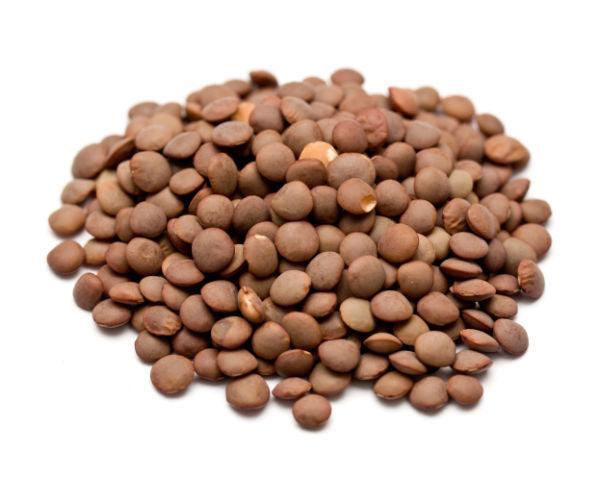



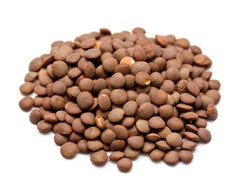
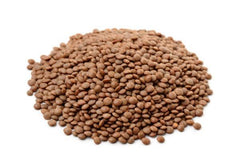
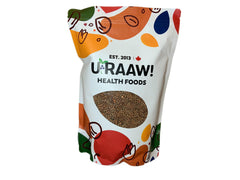
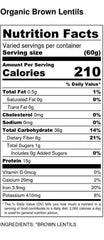
Description
xMild and earthy in flavor, brown lentils are a nutritional powerhouse loaded with plant-based protein, fiber, and essential nutrients. Widely used in Asian and North African cuisines, these versatile legumes are a staple in dishes like soups, stews, and Indian dhal.
Rich in iron, brown lentils are an excellent addition to vegetarian and vegan diets, serving as a fantastic alternative to meat. They hold their shape well during cooking and offer numerous health benefits, including reducing the risk of chronic diseases and improving gut health.
Our 100% organic brown lentils are an affordable and healthy way to enrich your meals with protein, fiber, and essential nutrients.
Nutritional Profile
Brown lentils are packed with beneficial nutrients, making them a staple for health-conscious eaters:
- Protein: 17.9g per 1-cup serving (198g)
- Fiber: 15.6g per 1-cup serving
- Calories: 230 per 1-cup serving
-
Key Micronutrients:
- Vitamins: Folate, thiamine, riboflavin, niacin, and B6
- Minerals: Iron, magnesium, potassium, zinc, and phosphorus
Lentils are also rich in polyphenols, a group of phytochemicals with antioxidant and anti-inflammatory properties.
Potential Health Benefits
1. Protect Against Chronic Diseases
Brown lentils are rich in polyphenols such as procyanidin and flavanols, which exhibit powerful antioxidant, anti-inflammatory, and neuroprotective effects. Research shows that these compounds can help:
- Prevent the growth of certain cancer cells, particularly skin cancer.
- Improve cholesterol profiles by increasing HDL (good cholesterol) and reducing LDL (bad cholesterol) and triglycerides in people with type 2 diabetes.
2. Support Heart Health
Lentils help reduce several risk factors for heart disease:
- Lower Blood Pressure: Lentils can naturally help reduce blood pressure, a leading cause of heart disease.
- Control Homocysteine Levels: High levels of homocysteine, linked to heart disease, can result from insufficient folate. Lentils, a rich source of folate, help prevent this.
- Aid Weight Management: Their filling nature and ability to stabilize blood sugar levels may help reduce calorie intake, lowering obesity-related risks for heart disease.
3. Improve Gut Function
High in fiber, lentils support gut health by:
- Promoting regular bowel movements.
- Feeding healthy gut bacteria, which can boost immunity and reduce inflammation.
How to Cook Brown Lentils
Brown lentils are easy to prepare and quick to cook:
- Rinse thoroughly.
- Use 3 cups of liquid (stock or water) for every 1 cup of lentils.
- Bring to a boil, then reduce heat and simmer for 15–20 minutes until tender.
Brown Lentils FAQ
Q: What are brown lentils?
A: Brown lentils are edible seeds from the legume family, known for their mild flavor and versatility.
Q: Are they high in protein?
A: Yes! They provide 17.9g of protein per 1-cup serving.
Q: Are they a good source of fiber?
A: Absolutely! Brown lentils contain 15.6g of fiber per 1-cup serving.
Q: What nutrients do they contain?
A: They’re rich in folate, iron, magnesium, potassium, zinc, and a variety of B vitamins, including thiamine and niacin.
Q: Can they replace meat in meals?
A: Yes, their high protein and iron content make them an excellent meat substitute.
Why Add Brown Lentils to Your Diet?
Brown lentils are a versatile, affordable, and nutrient-dense ingredient perfect for a wide range of recipes. Whether used in soups, stews, or salads, their rich nutritional profile and numerous health benefits make them an easy choice for a balanced and wholesome diet.
With their ability to promote heart health, support gut function, and reduce the risk of chronic diseases, brown lentils are more than just a pantry staple—they’re a cornerstone of healthy living.
- Choosing a selection results in a full page refresh.


